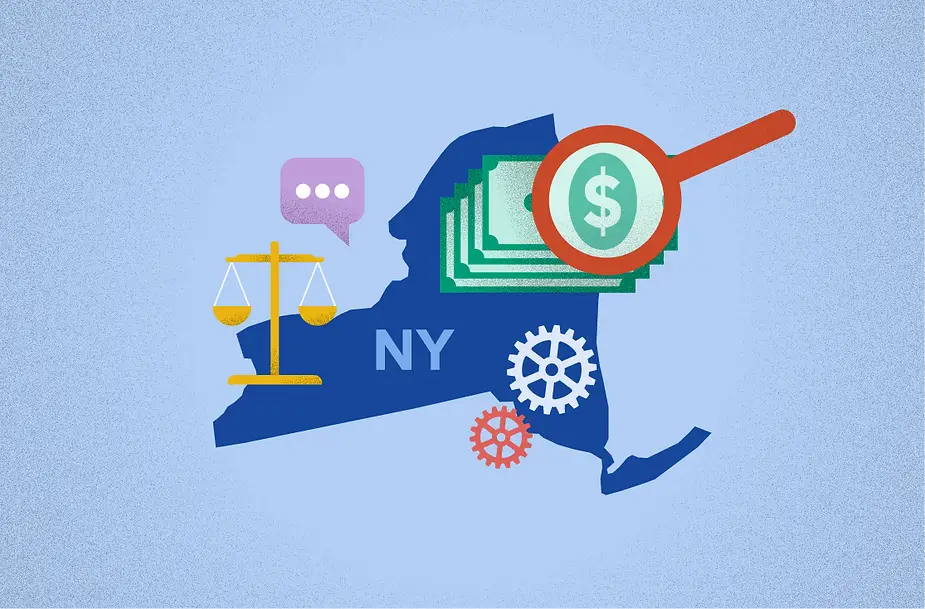The new NYC wage transparency law goes live in 2022—here's how it'll affect workplaces and employees.
Okay, let’s talk about the new NYC wage transparency law. In case you missed it: beginning in May 2022, NYC employers will be required to list expected salary bands for all job postings. However, the law was delayed just before it went into effect to give those involved more time to consider how the law will work in practice. As of now, it's supposed to go into effect in November 2022.
What Is the NYC Wage Transparency Law?
The new NYC wage transparency law requires employers to list the salary range in their job advertisements. This lets applicants know the minimum and maximum salary or hourly rate they can expect if they get the job offer.
While this law is intended to help groups of people with historically lower compensation, it's bound to help just about anyone looking for a job. Everyone from the fresh college graduate to the introverted employee will have the information they need to advocate for themselves—and it'll also prevent wasted time applying for jobs that don't match their desired pay range.
Why We're Celebrating the NYC Pay Transparency Law
Ever since the NYC pay transparency law was announced, my LinkedIn feed has been flooded with employees far and wide metaphorically shouting from the rooftops in glee.
And why shouldn’t they? Whether you’re new to the workforce or twenty years in, the struggle to gauge your market value is real. Questions like “Did I ask for too little?” and “How do I know if I’m being paid fairly?” play on endless repeat in most people’s minds. And that confusion only gets worse if you happen to come from a low socioeconomic background, lack a professional network, or worry that asking for too much will lead to an automatic rejection.
So. Employees across my network are celebrating the new wage transparency law as enthusiastically as they can, and I—as someone who did come from a low socioeconomic background, lacked a professional network, and worried about asking for too much when I first entered the workforce—am here for it.
Why Employers Aren't As Happy About the Law
Employers, on the other hand, have been decidedly . . . less vocal.
And really, this makes sense.
After all, if most employers were in favor of posting salary bands on job descriptions, it would have happened by now. (We here at Ethena have been thinking critically about how to make job descriptions more approachable since last year and—luckily enough—already have plans to list salary bands on our job descriptions on April 1st.)
Instead, most employers will now be forced to make a change they never planned for. And with these changes will come higher levels of accountability, more difficult conversations, and a whole lot of last-minute, panicked internal auditing for anyone who isn’t feeling super confident about their pay equity game.
It’s scary. Change is scary.
But here’s the thing. Wage transparency doesn’t just benefit employees: It also benefits employers. And it’s important that we articulate exactly why that is so we can all get onboard the wage transparency train and normalize wage transparency nationwide, regardless of legal requirements.
5 Ways the NYC Salary Transparency Law Helps Employers
For all the employers out there feeling overwhelmed instead of elated, here are just some of the reasons why we at Ethena are pretty darn stoked about the latest wage transparency law.
1. Wage transparency helps employers gauge market value
Wage transparency will help employers be far better equipped to gauge their own employees’ market value.
The fact of the matter is, employers struggle to gauge market value, too. We do our best, but compensation software tools and network data only go so far. Market value fluctuates with such rapidity that it can sometimes feel impossible to keep up. We’re frequently forced to recalibrate as new market information comes in from job candidates, recruiting agencies, and outsourced market research.
Now, imagine a world where employers could just go online and get live access to salary information at other companies, a world where access to your competitors’ salary ranges is just a few clicks away. That’s what nationwide wage transparency looks like.
2. Wage transparency will optimize the recruitment process.
Anyone who’s ever been on a recruiting team before has likely experienced that “oh no” moment when you get to the end of the interview having finally found “the one” only to learn at the last minute that your candidate’s compensation expectations are tragically out of your budget.
Perhaps the candidate is coming in from a more highly compensated industry, or maybe they’re actually just a bit more experienced than you actually need for the role. Whatever the case, the sad truth is that sometimes, the budget you have on offer isn’t enough for the candidate you want to hire.
As difficult as that can be to accept, coming to terms with that fact before you initiate the interview process saves both the candidate and the employer an incredible amount of time, energy, and emotional investment. Moreover, it lowers your risk of eliciting a poor candidate experience and empowers your recruitment team to invest more time in recruiting candidates whose salary expectations line up with the allocated budgets.
3. Wage transparency opens the door to greater trust
Most employees struggle to trust their employers when it comes to pay equity. And who can blame them? Imagine walking into a clothing store without any price tags and being expected to trust the cashier to charge you the same amount for that trendy white tee as they charged the last person.
Pretty absurd, right?
That’s exactly what most employers do to their employees. Employees are offered compensation packages and salary increases without any insight into what salary bands are being applied to everyone else in their role. This means that it doesn’t matter how honest or well-intentioned the managers and HR reps on the other side of the conversation are: at the end of the day, there’s just no way for employees to know for certain that their employer is being honest and equitable.
The negative impact here is enormous. Lack of trust leads to a lack of morale–and that’s just the start. Lack of morale leads to lowered productivity, long-term resentment, negative work culture, a hit to employer branding, and, ultimately, higher turnover.
It’s an incredible cost that could be drastically reduced by the simple act of sharing salary bands transparently across the company. It is far more effective to give employees access to salary information so they can spend less time worrying about pay equity and more time kicking butt in their role.
4. Wage transparency allows employers to correct pay inconsistencies faster
Because once employees know what salary bands apply to their role, you better believe they’re going to be paying close attention and letting their employer know if they feel like they’re being underpaid.
Which, as far as I’m concerned, is a really, really good thing.
5. Wage transparency empowers managers to better handle pay discussions with their team
If there’s one thing most managers seem to be absolutely terrified by, it’s the concept of having to make pay decisions for their direct reports. And it’s not hard to see why.
They’re often forced to make decisions that directly impact their team’s livelihood with limited context and even less confidence. With such limited insight, they’re not able to flag market inconsistencies, adequately respond to their reports’ pay concerns, or properly advocate for their team’s compensation. This kind of dynamic can often lead to a deep, damaging rift between individual contributors, management, and company leadership.
Providing both managers and reports alike with clear and transparent salary bands allows everyone to work within the same framework. This means fewer unpleasant surprises, easier “difficult” conversations, and an easy way for managers to advocate for their teams if they feel the salary bands are no longer competitive with the market.
NYC Wage Transparency Is Coming...
And it'll be here before you know it.
Now, does this mean there won’t be any speed bumps along the way to wage transparency? No. Will this lead to more questions, more difficult conversations, and more time spent needing to carefully articulate our thought process with each comp decision that we make? Almost certainly.
The NYC wage transparency law is scary for most employers because it’s relatively new. It’s different. It means we’re going to face situations and challenges we’ve never faced before.
But we’re already doing that. And if these last few years have shown us nothing else, it’s that we have the power to rise to the occasion and leverage change for success.
And I, for one, cannot wait to see just how far the shift towards wage transparency takes us.









